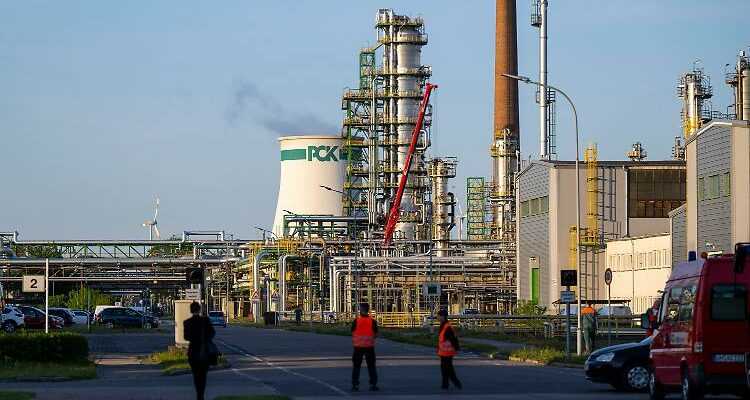“We need Schwedt”
Habeck: Are prepared for a change of operator at the refinery
05/09/2022, 9:25 p.m
The refinery in Schwedt is majority-owned by a Russian group, specializes in processing Russian oil and supplies large parts of eastern Germany. With the foreseeable discontinuation of previous deliveries, Minister Habeck is struggling to preserve the plant – and the jobs.
The federal government sees good chances of maintaining the PCK refinery with around 1,200 employees in the event of an EU oil embargo against Russia. “We have an answer for all eventualities, should the ownership structure in Schwedt change,” said Economics Minister Robert Habeck during a visit to the refinery on the Oder in front of hundreds of employees. “Right from the start, it was always about maintaining this PCK site as a company as fully as possible.” One is prepared for a change of ownership at the refinery controlled by the Russian Rosneft group. The legal and financial preparations have been completed, he said.
Preparations for new oil wells via ships via Rostock are already underway. The oil could also come from the national reserve, Habeck said. The ordering of oil tankers would have to be made by the owners. He hopes for an owner who says he has read the signs of the times. Work is also already underway on the financing of losses by the federal government and on a possible trustee structure. “If all three work, then you have job security for the near future. (…) We need Schwedt,” said the Green politician. In the long term, PCK could then develop further towards hydrogen – because the climate change would mean turning away from fossil fuels anyway.
Shell will play an important role
Habeck did not want to say how a change of ownership could come about. “We are in talks with many players.” The exchange is confidential. It is considered certain that Schwedt’s second largest shareholder, the Shell group, could play a role. He had already confirmed talks. While Rosneft holds more than half of Schwedt, Shell has almost 40 percent. The rest lies with the Italian Eni.
One possibility for a change of ownership would be a so-called technical insolvency, if Rosneft itself could no longer supply oil for the refinery due to the embargo or sanctions planned by the end of the year. The new Energy Security Act, which makes expropriation possible, would open up another way. It is expected to come into force in June.
PCK supplies Berlin and East Germany
However, the Economics Minister again warned of possible supply bottlenecks. “So that can also go wrong in different places,” said Habeck. “The fact that the whole construct fails as a whole will not happen.” PCK boss Ralf Schairer said: “We are doing everything to ensure our continued existence.” Brandenburg’s Prime Minister Dietmar Woidke demanded: “The supply must work. We are talking about critical infrastructure here.” With over 3,000 direct and indirect jobs, Schwedt is also by far the largest employer in the region.
The EU Commission plans to phase out Russian crude oil supplies for Germany and most other EU countries within six months. The “Druschba” (friendship) pipeline from Russia ends in Schwedt in Brandenburg. The oil is processed at PCK. Germany currently has a 12 percent share of Russian oil, which is primarily processed in Schwedt. The refinery supplies large parts of eastern Germany and even parts of western Poland. In addition to petrol, diesel and heating oil, kerosene for air travel is also produced.
The extent to which the refinery shapes the city of Schwedt with its 30,000 inhabitants becomes immediately clear when you visit: the huge facility can be seen from afar. With PCK and the paper mills, the town in the Uckermark is a large industrial location in Brandenburg. The city center was 85 percent destroyed in World War II. The cityscape is also characterized by numerous prefabricated buildings, but the old town with churches worth seeing and quiet squares has been lovingly renovated. Poland begins very close by: the national park city lies on the Oder. The most important thing for the mining, chemical and energy trade union is to at least maintain the number of employees at PCK.
